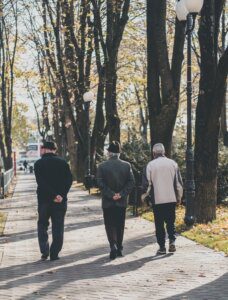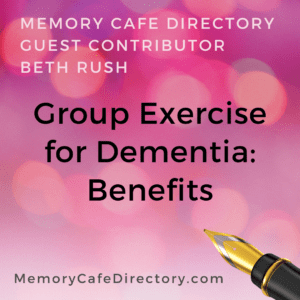Memory Cafe Directory posts and/or links to retailers can be advertising, sponsored, or affiliate links. We may earn a small commission from them. Thank you.
Dementia is a progressive disease that affects the brain. Today, we’ll look at the benefits of group exercise for individuals living with dementia.
Typically, dementia doesn’t present itself until later in life. It can inhibit memory, interfere with the ability to concentrate and even cause changes in personality. Specific symptoms depend on which area of the brain is affected by the disease. As dementia spreads, symptoms become more pronounced.
Unfortunately, there’s no cure for dementia. However, lifestyle changes can increase the quality of life for loved ones suffering from this disease. People with dementia can especially benefit from engagement with others and physical movement. Group exercise classes meet both of these needs and can benefit the lives of persons with dementia.
Benefits of Group Exercise for Dementia Patients
Stimulation in group exercise classes is one of the best ways to protect against memory loss and other symptoms of dementia in older adults. When people spend too much time alone or are inactive, their brain activity slows down. Physical and mental stimulation keeps the brain fit and able to process and retain information quickly.
Both social engagement and physical exercise keep the brain stimulated and improve mental health. Although these activities can’t cure dementia, they can positively benefit dementia patients by improving their quality of life. You can compare this to weightlifting for a paralympic athlete – lifting weights won’t heal their injury, but it will improve their overall health.
All forms of exercise benefit the brain by supporting healthy blood vessels. Physical activity reduces hypertension and increases oxygen levels in people’s bloodstreams. This improves healthy blood flow and increases the amount of oxygen available to the brain. Oxygenated blood services the nerves in your brain, equipping them to work efficiently.
Studies show that working out strengthens your memory and can protect the human brain from shrinking as it ages. These results have been so encouraging that exercise is being explored as therapy for patients with neurodegenerative diseases like Alzheimer’s.
In addition to supporting neural health, exercise can reduce chronic inflammation and boost your immune system.
Group exercise also offers the benefits of social stimulation. When people spend too much time isolated, they may start to feel depressed and anxious.
Time with others also leads to meaningful connection, laughter and reminiscing. Studies show that social engagement has a positive impact on physical as well as mental health.
Older adults who are struggling with their hearing or mental health may want to avoid social situations like group exercise. However, this will only make their symptoms worse. Wearing hearing aids can help seniors reconnect and keep brain stimulation high. Group exercise classes often become less stressful over time as they turn into a familiar part of routine.
Social Activities for Dementia Patients
There are many different exercise groups for older adults. They cater to different levels of movement and coordination, ranging from very simple to complicated classes. Some exercise classes offer companions for seniors so they can have personal support during class. Here are five excellent social activity options for dementia patients.
1 Chair Exercise
Persons with dementia can benefit from chair exercise classes. These classes use simple movements from a seated position to improve blood flow and stretch muscles.
Instructors for chair exercise classes move slowly and talk members through each movement as they go. These classes are perfect for people with low energy, inhibited balance or slow comprehension.
Although chair exercise seems simple, it benefits dementia patients in a number of ways. Classes give seniors something to look forward to and a place to develop friendships. These slow movements wake muscles up gently and increase blood flow. They can also improve flexibility through gentle stretches.
2 Walking

Photo by Alexandra Marta on Unsplash
Older adults who are still mobile can benefit from walking. The simple motion of putting one foot in front of the other can benefit every system in the body.
Walking improves blood flow and sends an abundant supply of fresh oxygen to the brain. This boosts memory, improves cognition and makes people feel happier.
You can make walking even more effective by doing it with other people. If a loved one is suffering from reduced brain function, go walking with them. You can also help them join a walking club with members who move at their pace. This will boost their emotional and physical health. Walking in a group is safer and turns the task of exercising into a fun, social experience.
3 Swimming
Swimming is an excellent activity for adults with dementia symptoms. Water supports the body, reducing pressure on ligaments and relieving pain. It makes cardio movements easier by slowing them down, creating a safe environment for seniors to benefit from physical activity. Swimming can also improve coordination and quality of sleep.
The physical activity of swimming stimulates the body and brain. It can give seniors a safe place to exert themselves without the risk of a fall. These classes are also prime opportunities for socialization as members and instructors get to know each other. If your loved one has plenty of energy but reduced mobility, water aerobics may be the perfect fit for them.
4 Dance Classes
Studies show that dancing is good for your brain. It improves memory and reduces your risk for depression. Some studies even suggest that dancing enhances neural connections, improving the brain’s plasticity and ability to adapt. Dancing also boosts mood, reminding seniors of music they once loved and inspiring laughter.
Try taking your loved one to a dance class and see how they respond. This is a great way to combine physical movement with social connection in a fun, low-key setting. Dances are broken down into simple steps by an instructor and set to music that seniors recognize. Most senior dance classes have members with a wide range of mobility.
5 Tai Chi
This type of exercise comes from China and uses gentle movements to improve balance, flexibility and strength. Movements are completed from a standing position and require people to continually shift their weight. Arms move through the air slowly, taking different positions. People watching a Tai Chi class may feel like they’re watching a slow, graceful dance.
Tai Chi movements are meant to extend and contract important muscles throughout the body. Because the exercises are slow, adults are encouraged to breathe deeply with each movement. Research shows that Tai Chi significantly improves stability, reducing the risk of falling. It can also reduce pain and improve concentration, making it an excellent option for adults struggling with dementia.
Group Exercise for Dementia: Join a Group Exercise Class
If your loved one is struggling with dementia, taking them to an exercise class can improve their quality of life. Exercise sends oxygen to the brain and can strengthen memory and improve cognitive function. It also reduces blood pressure and chronic inflammation. Although it won’t cure dementia, gentle exercise can benefit your loved one’s brain and body.
Group classes combine exercise with an opportunity for social connection. Dementia often causes individuals to withdraw from their surroundings. However, social engagement keeps the brain stimulated, boosts mood and gives purpose to daily activities. Maintaining friendships for as long as possible is important for seniors with dementia. Use these tips to place your loved one in an exercise class that will add health and happiness to their routine.
About the Author

Beth Rush
Beth Rush
Beth Rush is the Managing Editor and Content Manager at Body+Mind.
Body+Mind features articles about diet, fitness, mental health, parenting and health care.
Become a Contributor!
 Do you want to be a Memory Cafe Directory contributor? If you have helpful information to share with our community, read about the guidelines, then get in touch to discuss what you have to offer.
Do you want to be a Memory Cafe Directory contributor? If you have helpful information to share with our community, read about the guidelines, then get in touch to discuss what you have to offer.
Thank you.




